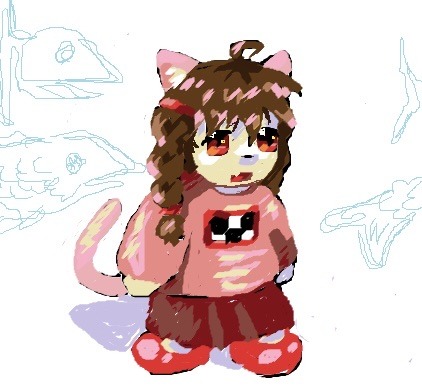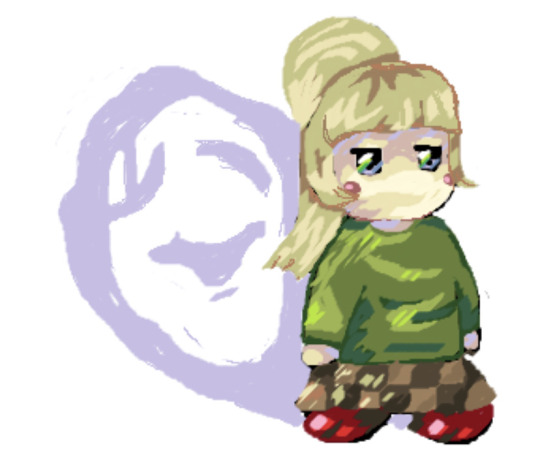Text
RECOVERING PROGRAMMED PARTS
Trigger warning for discussion of RAMCOA and programming.
This post will be focused on programmed parts recovering, I will mainly be speaking from my personal experience. If other survivors have more to add on, you are more than welcome to reblog this post and add your experience and advice.
First, I want to preface this post by saying that everyone's experience is going to be different. No two systems are the same, the same applies to programmed systems and programmed parts. Recovery for these parts will entirely depend on what they have been programmed to do or believe.
Show them kindness. Arguably the most important first step, showing kindness and acceptance to these parts is extremely important. Remember that they do not do these things out of choice, but rather out of trauma and feeling a need to do so. You do not have to condone their behaviors, and you are allowed to feel hurt by them, but you should not take this out on them. They are just as traumatized as any other part in the system.
Start slow. There is no rush to recovery. Recovery is also not always linear, and setbacks do not mean you are back at square one. Try encouraging your programmed parts to take small steps outside of their programmed roles, if it is safe to do so. For example, a part who is programmed to be aggressive may be encouraged to do something calming such as going for a walk or listening to some music.
Find new jobs for them. In our experience, many programmed parts struggle with the thought of not having a job or "purpose". This may not be the case for your programmed parts, but if you notice this type of thinking, try to help them find jobs that they are comfortable with that benefit the system in current life. For example, a high-ranking internal handler may have a lot of knowledge about the system and could do a good job of keeping track of information about the system in a helpful and healthy way.
Help them find themselves. Having a more beneficial job and experiences outside of trauma is a good start, but often helping these parts find more of a sense of identity can help them recover as well, when it is safe for them to do so. For example, many programmed parts in our system are involuntarily assigned a title, choosing a name when they feel ready is incredibly healing for them. There is no rush to do this, and you should not try to force any part who is not ready into doing this, especially if they feel that they may be punished by other parts.
Help them question things. Ideally, this should be done with the help of a therapist. Helping these parts question the things they were taught to believe can be incredibly helpful, but it must be done on their own terms, when they feel ready, and very carefully. Please do not try to force beliefs onto them, but rather give them space to question what they were taught on their own terms, when they are ready to do so.
My experience.
I was a high-ranking internal programmer for quite some time, and a few months ago I started making an attempt to recover. I began speaking to people both inside and outside my system who did not share my role, and because of this I was able to begin questioning some of the things that I had been taught.
I am still not completely free of all of my beliefs, but when they do come up, I do my best to remind myself that those are things other people instilled into me as opposed to my own conclusions.
The things that have been most helpful in my recovery have been other individuals showing me kindness and acceptance, despite my actions, and the ability to do things on my own terms, when I feel ready.
If anyone has anything to add to this, or any questions, feel free to reblog or send us an ask. I will do my best to answer any questions, and I would appreciate any additions to this post, as I think sharing healing information is something that should be done more often.
- Adonis
40 notes
·
View notes
Text
Clinical lycanthropy
Clinical lycanthropy (CL) falls under the umbrella of Delusional Misidentification Syndrome (DMS). DMS is a collection of delusions involving misidentification of others, the self, objects, or places. In the case of clinical lycanthropy, it is a delusional misidentification of the self. People with CL believe that they are an animal, or are transforming into one.
The animal doesn’t have to be a wolf or werewolf, though canines are the most common - there have been case reports of CL involving snakes, cats, cows and even bees. (Technically, CL has many different names depending on what animals are involved - e.g., CL involving dogs is called kynanthropy, cows is boanthropy, cats is ailuranthropy, and multiple animals (or general/unspecified animal transformation) is zoanthropy). CL occurs all over the world, and the animals involved are often significant in the culture(s) of the person with CL - for example, CL involving rabbits in the US, where rabbits are popular pets, foxes in Japan and hyenas in Africa. Guessoum et al. theorise that CL is a culture-bound syndrome (reflective of culture).
CL is a somatic delusion, meaning it involves the body. Hallucinations can be part of CL, for example: feeling or seeing hair growing on the body, or teeth sharpening into fangs. Some people with CL see themselves transforming when they look in the mirror. Some people don’t hallucinate their transformations, but they have “body schema illusions” (i.e., feel like their body has changed).
There is often overlap with other DMS delusions, particularly other delusional misidentifications of the self. Some people, with or without CL, believe that others have transformed into animals. There have been more than a few cases of people with CL and Cotard’s, where they believe they or their organs are dead or dying. Often, a person will cycle through different DMs, sometimes reoccuringly.
Sometimes, the act of transformation in CL, or the strength of the delusion, is dependent on the phases of the moon. There has historically been an association with psychosis and the moon, especially when it’s full - this is where we get the word “lunatic” from.
Clinical lycanthropy is associated strongly with mood disorders, psychotic disorders, and sleep disorders (particularly obstructive sleep apnea). It may be associated with stress and trauma, and can manifest symbolically. For example, a person who goes through abuse and feels dirty and worthless might develop clinical kynanthropy (dog) as a psychotic reaction to trauma. Or a person who goes through abuse might develop clinical kynanthropy as a reaction to their need for love and attention.
Sources:
Guessoum et al., Clinical Lycanthropy, Neurobiology, Culture: A Systematic Review, Frontiers in Psychiatry, 2021.
Blom, When Doctors Cry Wolf: A Systematic Review of the Literature on Clinical Lycanthropy, History of Psychiatry, 2014.
Garlipp et al., Lycanthropy - Psychopathological and Psychodynamical Aspects, Acta Psychiatrica Scandinavia, 2004.
165 notes
·
View notes
Text
Introduction to: Delusional Misidentification Syndrome
What is Delusional Misidentification Syndrome?
Delusional misidentification syndrome (DMS) is an umbrella term for a collection of delusions that involve misidentifying a person, object, place, body part, or the delusional person themselves.
DMSs are associated with neurological trauma, dissociation, and schizophrenic disorders.
Types of DMSs
DMSs typically involve misidentifying one of three things: the self, the other, and/or the place.
The self: These delusions involve the misidentification of the person themselves, or a part of their body.
The other: These delusions involve the misidentification of other people, pets, or objects.
The place: These delusions involve the misidentification of places or locations.
The Self
Mirrored self misidentification is the delusion that the person's reflection is someone else.
Syndrome of subjective doubles is the delusion that the person has a double (doppelgänger / clone) of themselves acting independently.
Cotard('s) delusion / syndrome is the delusion that the person, or parts of their body or organs, are dead, dying, or don't exist. Most people with this delusion have severe depression.
Clinical lycanthropy is the delusion that the person has turned, or is turning, into an animal. It can be considered a type of reverse intermetamorphosis.
The Place
Reduplicative paramnesia is the belief that a place or location (or, rarely, an object, person, or part of the body) as having been copied, existing in two places at the same time, or moved to a different location. Most case studies involve people reporting the hospital they are in is in their home town, when it isn't. "Paramnesia" is commonly called déjà vu.
The Other
Capgras delusion is the delusion that someone close to the person, such as a friend, family member, or a pet, has been replaced with an identical imposter.
Fregoli delusion is the delusion that other people are actually the same person in disguise. Capgras and Fregoli delusions often co-exist.
Intermetamorphosis is the delusion that other people can change their appearance and personality at will, pretending to be the person they are basing themselves off.
Delusional companion syndrome (DCS) is the delusion that objects (often stuffed toys) are sentient, and have their own sense of self, wants and needs.
What can be done for a person with DMS?
Option 1: Nothing. Psychotic people can live happy lives without any intervention!
Option 2: Therapy. This can include either accepting the delusion / going along with it, or trying to change it. It can be used in combination with pharmacotherapy (medication).
Option 3: Pharmacotherapy. Antipsychotics and other medication can help reduce symptoms. It can be used in combination with talk therapy.
No matter what choice the person makes (and it should be up to the person), the desired outcome is reducing suffering (which might not mean trying to stop or slow the psychosis) and increasing their quality of life.
68 notes
·
View notes
Text
Delusional Misidentification Syndromes Symbols !!
First photo:
Clinical Lycanthropy;
"Clinical Lycanthropy Syndrome" is a syndrome within the 'Delusional Misidentification Syndromes' (DMS) in which the person believes that they are a wolf, are becoming a wolf or were a wolf.
Second photo:
Vampirism/Renfield Syndrome;
"Vampirism/Renfield Syndrome" is a syndrome within the 'Delusional Misidentification Syndromes' (DMS) which the person who has it, believes that themselves are a vampire, was a vampire or they're converting in a vampire.


7 notes
·
View notes
Text
Hearing Voices & Unusual Experiences & Psychosis & Schizophrenia & Etc
Hearing Voices and Co 101
Community overview of hearing voices by BC hearing voices network and Hearing Voices Network of South Australia
A rare community and medical overview of hearing voices by Understanding Voices
Medical and Mental Illness style overviews of hearing voices (separate from pages on psychosis and schizophrenia, which is kinda nice) by Mind UK and Rethink Mental Illness
Explanation of psychosis by Likemind UK
Explanation of schizophrenia by Project LETS
Lived Experiences
“LUNAR: a psychosis zine” by feyxuan, interviewing 6 folks with lived experiences
“A Bipolar, A Schizophrenic, And A Podcast” hosted by Gabe Howard and Michelle Hammer aka Schizophrenic.NYC
“MadHaus” podcast by Maddie Jericho, who also is part of Students With Psychosis
“Living Well with Schizophrenia” Youtube channel by Lauren
“The Collected Schizophrenias” by Esmé Weijun Wang, book review with quotes here
Dealing with Life
Lists of coping strategies by Hearing Voices Network Aotearoa New Zealand, Hearing Voices Network Australia, and Manchester Hearing Voices Group
Advice from young people hearing voices by Manchester Metropolitan University
“Dealing with Psychosis” toolkit by Early Psychosis Intervention program in Canada
List of Hearing Voices Networks around the world on Intervoice website
Peer support groups for folks with “schizophrenia or a schizophrenia-related illness”, family and caregivers, and a helpline by Schizophrenia and Psychosis Action Alliance
329 notes
·
View notes
Text
My tips for getting therapy for schizospectrum disorders!

I’m somebody who’s always been good with navigating finding therapists who specialize in my issues. When my friends need a therapist they come to me to scroll thru Psychologytoday for them and find someone for their niche. When I was diagnosed with schizotypal I expected the same thing to happen… but when I tried Cognitive Behavioral Therapy like most of the easily accessible sources suggested, it didn’t seem to help. After not finding any easy answers I contacted specialists and read studies, as well as digging a little further online. Here is my findings!

Psychologytoday is not great for searching for schizospectrum friendly therapists
This gagged me. I have always used psytoday to search for therapists. But not only does it not have tags for most of the therapy models I’m going to list, it doesn’t even let you search for schizophrenia (you can search psychosis but if you want schizotypy specific help that can be too broad) and doesn’t have a custom keyword search (afaik)
I had way better results using inclusivetherapists.com which let’s you do your own term search and has a schizophrenia spectrum tag! It also had tags for multiple of the therapy models below. I got my current therapist this way and it is going well so far! However, the site only services the US, Canada, and Hongkong
“The Recovery of The Self In Psychosis” was a really invaluable resource and I suggest getting your hands on it
When I was starting to feel discouraged I found this publication via the MERIT institute’s website. Which I found when searching for schizospectrum specific therapy research. It outlines a few therapy models (including MERIT) that are tailored to help psychosis. It also outlined why CBT for psychosis can be ineffective. There is a focus on patient rights and self determination that I loved. Plus the suggested pdf reader for mobile has a robot voice that will read it like an audiobook for you!
Here are the models that were suggested to me by professionals I contacted and by this publication
Psychodynamic Therapy (has an IT tag)
Mentalization Based Treatment (MBT)
Metacognitive therapy (MCT) (has a tag)
Metacognitive reflection and insight therapy (MERIT)
Narrative Enhancement Cognitive Therapy (NECT) (the more general narrative therapy does have a tag)
Psychodynamic is the easiest to find out of these and the least specifically geared towards psychosis. It is, however, customized towards the needs of the patient. MERIT and NECT are the most geared towards psychosis.
A lot of these models focus on forming a sense of self, improving relationships, and identifying emotions. A lot of them are also still experimental and/or uncommon. On the other hand, they at least aren’t all only available in America. Many professionals in the readings I saw were located in Europe or Israel, and hopefully there will be more in other countries.
What I personally did was look for a therapist with schizophrenia spectrum experience, and then tell them about these models as something I was interested in. The pickings were slim in my area so I set it to the entire state of residence and looked for online treatment.
Another method is to contact outpatient programs at hospitals or behavioral health centers which is where many of these therapy models are being employed. I am in contact with a “community center” that gives aid to those with severe mental illness, but I haven’t started treatment and I know it’s definitely something many of us will be hesitant about considering systemic abuse common in this kind of facility.
What I saw outlined was that forming a safe, honest relationship with your therapist can be more important than what model is used. That will help with negative symptoms as well as helping with feeling safe in reality instead of having to retreat into delusion/fantasy/emptiness.
Going into my first sessions with my new therapist I made a list of things I tend to hide from therapists and sent it to her. I also got permission from her to send diary entries or emails to help me not blank out in therapy and to make sure I express myself honestly. I’m still in the beginning phases, though, so please take this just as a starting point where YMMV greatly. I’m also no professional!
Thank you for reading, I wish you luck in your journey!!! Reblogs and additions appreciated!

1K notes
·
View notes
Text
we talk a lot about how mental and physical disabilities are different lived experiences and just having one doesnt mean you understand the other, BUT i dont see a lot of people talk about how they can still interact with and feed off of each other!! so heres a shoutout to:
medical trauma survivors
medical abuse survivors
people with endocrine disorders that affect their brain chemicals
people who are depressed due to the isolation of living in an inaccessible world
people who are anxious due to ableism in the world
people whose mental illnesses led to their physical condition worsening
suicide attempt/self harm survivors who retained lasting injuries, pain, or other illnesses
physical abuse survivors who retained lasting injuries, pain, or other illnesses
people with chronic illnesses induced by eating disorders
people with chronic illnesses induced by substance abuse
developmentally disabled people whose condition affects both their mental and physical motor skills
people whose psychiatric medical team doesnt understand their physical barriers
people whose physical medical team doesnt understand their mental barriers
people caught in the loop of their mental and physical conditions making each other worse
and everyone else who lives with me in the middle of the venn diagram of physical & mental disabilities. its hard when everyone seems to assume you can only be one or the other, especially on a website full of discourse yet entirely devoid of nuance. i love each and every one of you!
2K notes
·
View notes
Text
poor memory is a huge deal and i wish people wouldn't diminish it by saying "oh yeah i can't remember what i had for breakfast lol."
i can't remember the first 10 years of my life. i can't remember entire days, weeks, months at a time. i can't remember entire people, i can't remember names or faces. i can't remember when things are scheduled for, my calendar app on my phone is booked to the max with reminders and task checklists. i can't remember when i moved into what home when, i can't remember important milestone dates like when i got or lost certain jobs, or when i started a new hobby.
that's what i mean when i say i have poor memory. poor memory is so scary for the person who has it. it's not a quirky thing, everyone forgets small details. memory problems are scary because you can go through entire events or days with no memory, or plan for things in the future that you can't recall ever even looking into or scheduling. it's not a funny haha kind of thing, it's serious, and it affects a lot of people in very unavoidable ways.
not being able to plan for appointments or work schedules, not being able to remember people's names or faces, not being able to recall whether or not you were present for something or whether or not you met someone, not being able to keep track of what's happening on what dates and losing track of items because you can't remember where you put them are all very real problems, and anyone dealing with them deserves to be taken seriously, and not diminished when they choose to speak up about it.
8K notes
·
View notes












